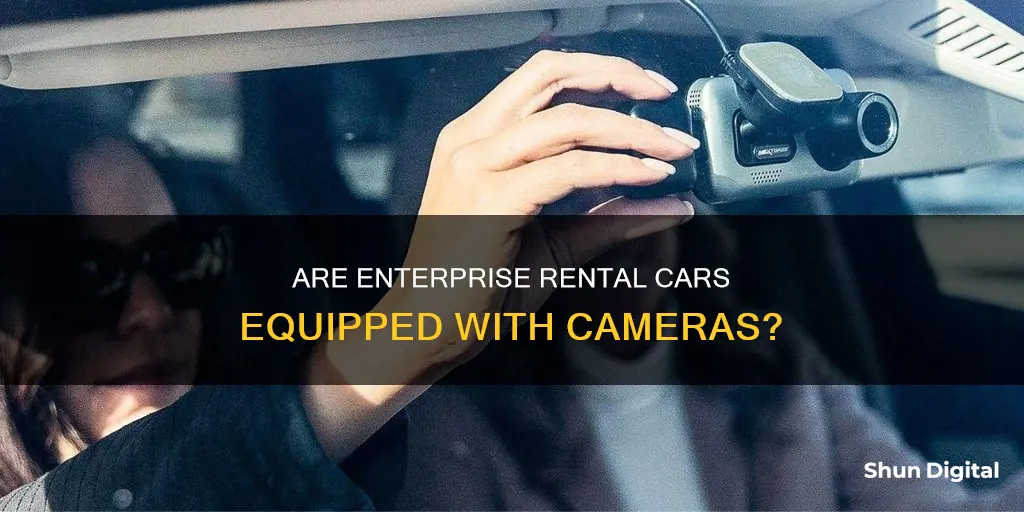
Are rental cars keeping an eye on you? With the development of surveillance technology, it's a familiar concern for many. While rental cars do not have hidden cameras, they may have dash cams and other camera-based sensors that are part of the driver assistance and safety package. These cameras include rearview and backup cameras that do not relay any information to the rental car companies. However, some rental car giants like Hertz have admitted to installing cameras in about one in eight of their cars in the United States, although the company has stated that these cameras have never been turned on. So, are rental car companies spying on their customers? Let's explore the topic further.
| Characteristics | Values |
|---|---|
| Cameras in Enterprise rental cars | Cameras are not commonly installed in Enterprise rental cars. However, some cars may be specially equipped with cameras for safety or navigation. |
| Camera types | Dash cameras, GPS tracking cameras, rearview cameras, telematics cameras |
| Camera purposes | Accident documentation, vehicle security, navigation assistance, safety monitoring |
| Enterprise policy | Enterprise Rent-A-Car discloses the presence of cameras in rental agreements, stating that cameras are primarily for security and safety. |
What You'll Learn

Enterprise Rent-a-Car states that it does not install cameras in its vehicles
Enterprise Rent-a-Car has stated that it does not install cameras in its vehicles. In response to a reporter's question, the company issued a flat denial, stating that their vehicles only come equipped with standard technology provided by automobile manufacturers. This means that some of their cars may have features such as OnStar technology, but the company cannot access this without an official police report.
The presence of cameras in rental cars has been a topic of discussion and concern for customers. While Enterprise denies installing cameras, some rental cars may have cameras for safety or navigation purposes. These include dash cameras, GPS tracking cameras, and rearview cameras. However, it is important to note that these cameras are usually only installed in some specially equipped cars, and rental companies typically provide transparency by disclosing the presence of cameras in their rental agreements.
The legality of using hidden cameras in rental vehicles is also a significant concern. In most situations, it is illegal to hide cameras without consent, as it violates privacy rights. Rental companies generally abide by comprehensive guidelines and safety device protocols to ensure customer privacy.
While Enterprise does not install cameras, they do have access to data stored on the car's computer, which can be used in litigation if the vehicle is misused. This data includes mileage, driving behaviour, and fuel information. Additionally, rental cars often have GPS tracking devices to locate the vehicle in case of theft or other issues.
It is worth noting that some rental car companies, such as Hertz, have admitted to having cameras installed in a small proportion of their fleet. However, these cameras have been stated to be inactive, and the company has faced significant backlash for this practice. Overall, the presence of cameras in rental cars varies, and it is essential to read the privacy policies and rental agreements of individual companies to understand their specific practices.
Forester Rear Camera Diagnostics: How to Access?
You may want to see also

Some rental cars have cameras for safety or navigation
Some rental cars have cameras installed for safety or navigation purposes. These cameras are usually part of the driver assistance and safety package, and they do not record the inside cabin space or relay information to the rental car companies. The most common types of cameras found in rental cars include dash cameras, GPS tracking cameras, and rearview cameras.
Dash cameras are positioned discreetly on the dashboard or windshield, recording the view ahead and providing invaluable evidence in the event of accidents or incidents during the rental period. They come with various features such as loop recording and collision detection, enhancing their utility for renters.
GPS tracking cameras assist in navigation by capturing footage and tracking the vehicle's location in real-time. They provide additional security for both the rental company and the customer by offering comprehensive monitoring and tracking capabilities.
Rearview cameras, often located at the back of the car, aid drivers in backing up and parking, especially in small spaces. They provide higher visibility and confidence, reducing the risk of collisions.
While some rental car companies like Hertz have installed cameras in their vehicles, they have stated that these cameras are not activated. Other companies, such as Enterprise Rent-A-Car, National Car Rental, and Alamo Rent A Car, have denied installing cameras in their vehicles, opting for standard technology provided by automobile manufacturers.
It is important to note that the presence of cameras in rental cars can be a concern for customers' privacy. Rental car companies address this issue by being transparent and disclosing the use of cameras in their rental agreements. Additionally, individuals have the right to privacy, and recording without consent is often illegal in many places.
Best Action Cameras for Extended Recording Sessions
You may want to see also

Dash cameras are commonly found in rental cars
Dash cameras, also known as dashcams, are often positioned discreetly on the dashboard or windshield of a rental car. They record the view ahead and are valuable for documenting accidents or incidents during the rental period. Dashcams come with various features, such as loop recording and collision detection, enhancing their utility for renters.
In addition to dash cameras, other types of cameras found in rental cars include GPS tracking cameras and rearview cameras. GPS tracking cameras capture footage while simultaneously tracking the vehicle's location in real time, providing navigation assistance and additional security. Rearview cameras, on the other hand, are designed to help drivers when backing up their vehicles, making it easier to park and avoid collisions.
While some renters may appreciate the added safety and security that dash cameras provide, others may have concerns about their privacy. It is important to note that rental car companies are not out to spy on their customers. Any information collected through these cameras serves the company's needs, such as monitoring the vehicle's location, odometer, median speed, and fuel level.
Before renting a car, it is recommended to read the company's privacy policies and ask about their policies regarding cameras. Rental companies typically have explicit policies regarding the presence of cameras, which should be outlined in the rental contracts and disclosure statements. By promoting transparency and open communication, rental agencies can boost trust with their customers while ensuring safety and security.
Unleashing Camera Raw's Power: From Basics to Advanced Techniques
You may want to see also

Rearview cameras are the most common camera in rental cars
The presence of cameras in rental cars has been a topic of discussion and concern for many renters. People often wonder if rental car companies are spying on them or monitoring their activities. While some companies like Hertz have admitted to having cameras installed in a small fraction of their fleet, they have assured customers that these cameras are not operational.
In general, rental car companies do not intend to spy on their customers. However, they do collect certain information through connected cars and other means. For instance, companies can track the location of vehicles with mechanical issues, accidents, or theft. They can also monitor fuel levels, odometer readings, and median speed. This data helps them locate and recover stolen vehicles, plan maintenance, and alert themselves of potential issues.
It is worth noting that rental car companies are transparent about the presence of cameras and data collection practices. They inform customers about these features through rental agreements and disclosure policies. Additionally, renters can communicate with the rental companies before renting to gain a clear understanding of their policies and procedures regarding cameras and data privacy.
While rearview cameras are the most prevalent type of camera in rental cars, other types of cameras, such as dash cameras and GPS tracking cameras, may also be present in some vehicles. These cameras serve various purposes, including enhancing safety, documenting accidents, and providing navigation assistance. Ultimately, renters should carefully review the rental company's policies and inspect the vehicle before use to ensure peace of mind during their journey.
Surveillance Camera Wiring: A Guide to Running Cables
You may want to see also

Rental car companies collect and use data for various purposes
One of the primary ways data is collected in rental cars is through the integration of GPS and infotainment systems. Customers often connect their personal devices to these systems for convenience, enabling features like hands-free calling, music streaming, and navigation. However, this practice can expose sensitive information, such as destinations, GPS coordinates, and even personal details from their phones. According to Consumer Watchdog, using Bluetooth in a rental car could put one's identity at risk, as rental companies may not have policies in place to ensure the deletion of such data after each rental.
Privacy International, a non-profit organisation, conducted a study by renting cars from various companies, including Sixt, Enterprise, National, Zipcar, and Thrifty. They found that information about previous drivers, locations the vehicle had travelled to, and previously connected smartphones was retained in the infotainment system. This lack of data wiping poses a potential privacy threat, as subsequent renters or unauthorised individuals could access this information.
In response to these concerns, some rental companies have started addressing the issue. For example, Thrifty mentioned creating an internal policy on deleting driver information to comply with GDPR regulations, and Sixt expressed a similar commitment. Enterprise, however, stated that it is the responsibility of users to ensure data deletion from the infotainment system, emphasising that they cannot guarantee the privacy or confidentiality of such information.
While rental car companies assert that data collection serves their needs and is not intended for spying, it is essential to recognise that this data can be used for various purposes. For instance, companies can use telematics data to optimise fleet management and understand consumer behaviours, and even determine rental pricing or insurance premiums. Additionally, rental companies may assess fees based on the use of telematic resources, such as remote unlock services.
In summary, rental car companies collect and use data for a range of reasons, from vehicle recovery to customer assistance and fleet management. While there may not be a malicious intent, the potential for privacy invasions and data misuse exists. As a result, it is crucial for customers to be vigilant about protecting their personal information and for rental companies to implement robust data protection policies and practices.
HP Camera Battery Drain: Tips to Conserve Power
You may want to see also
Frequently asked questions
Enterprise Rent-A-Car has stated that they do not install cameras in their vehicles. However, some cars are specially equipped with cameras for safety or navigation.
In most countries, including the United States, recording another person without their consent is illegal. Therefore, rental cars do not have hidden cameras.
Some common types of cameras found in rental cars include dash cameras, GPS tracking cameras, and rearview cameras.
Yes, rental car companies do monitor their vehicles for safety and security reasons. They may track location, rental contract compliance, and vehicle condition during the rental period.
Rental car companies collect various data, including vehicle location, mileage, driving behaviour, fuel levels, and service history. This information is used for maintenance, security, and customer service purposes.







